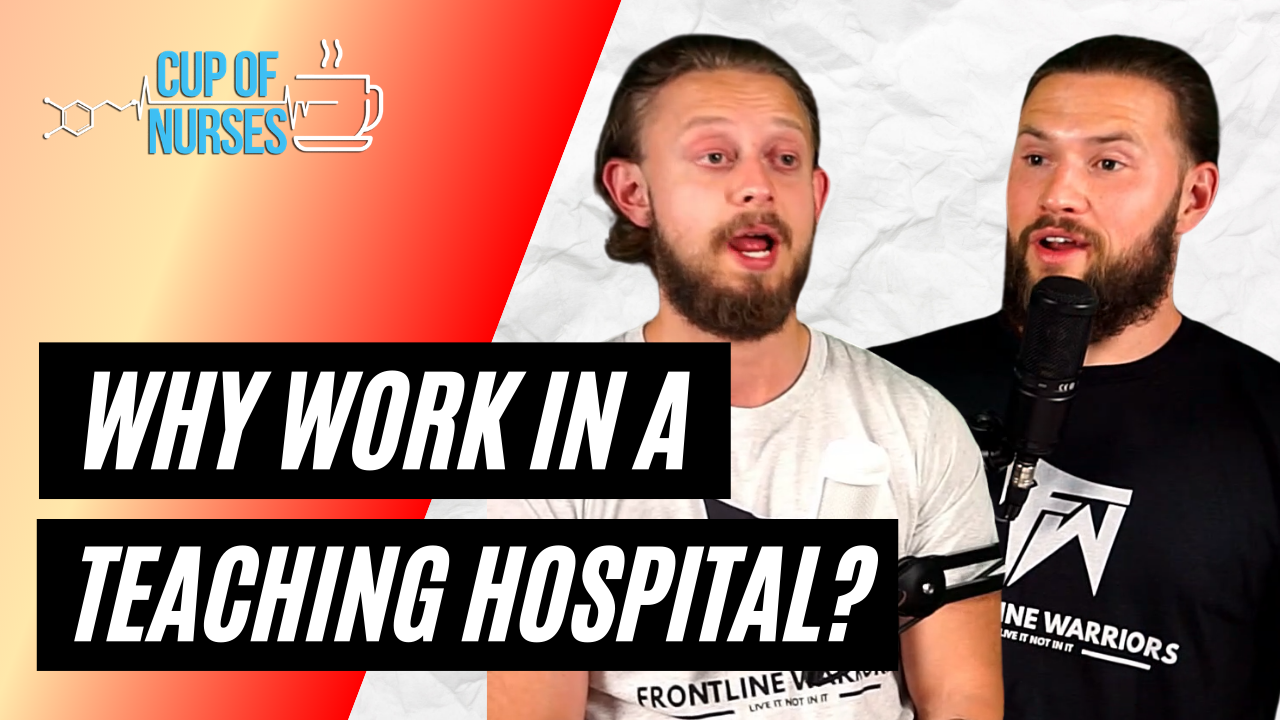Pros vs. Cons of Working in a Teaching Hospital
In this episode, we will talk about the pros vs. cons of working in a teaching hospital.
Working at a teaching hospital can be great for learning, and you’ll work with new residents every other month, but at times it can be frustrating as well due to the lack of experience.
The residents tend to be very smart and catch on fast.
According to the American Hospital Association, there are over 1,000 teaching hospitals that directly employ 2.7 million people and are among the largest employers in their communities.
Every state has at least one, with some states having over 50 teaching hospitals. Most teaching hospitals are non-profit.
Academic enterprise at teaching hospitals has research centers covering cardiovascular, genetics, gene therapy, gastroenterology, neuroscience, immunology, surgery, organ transplantation, stem cells, biomedical imaging, and cancer, with clinical trials and research projects.
The Pros of Working in a Teaching Hospital
- There is 24-hour physician coverage and support for nursing staff and patients.
- Exposure to cutting-edge medical care with research and innovation, including new medication technology and procedures
- Research and development findings are commonly shared with the staff
- Greater job satisfaction due to enhanced exposure to learning and witnessing current outcomes.
- Teaching hospitals are the backbone of medical services in the USA. The nation’s 1,000+ Teaching hospitals to train more than 100,000 new physicians and other health professionals every year.
- They disproportionately deliver specialized services, complex treatments, and life-saving care – including 88% of comprehensive cancer care centers and 71% of all level-one trauma centers. This makes teaching hospitals a natural choice for physicians working in these specialized services.
- Teaching hospital offers one other major advantage: improved career prospects. Whether through mentoring, research, published articles, or simply exposure to leading-edge treatments and technologies and high-caliber peers, working at a teaching hospital is good for your career [1].
The Cons of Working in a Teaching Hospital
- MDs are on duty 24 hours a day to write and adjust orders, which requires nurses to be vigilant about initiating orders on time like that 2 am urinalysis.
- Patients become the teaching tool because there are always groups of residents with MDs tending to a patient. This can be tiring for the patient.
- Sometimes “more” than less, concerning lab tests and diagnostic studies, is ordered. This subjects some patients to unnecessary testing. A great example like replacing potassium. They might replace 20 mEq/L at a time, recheck K+ and replace it again instead of the full 40 mEq/L.
- A new rotation of residents in clinical areas requires frequent orientation of where things are and hospital protocols.
- During a code, there tend to be more people than necessary. This can overwhelm families and even the medical staff running the code.
- There is a heightened need to check the accuracy of physicians’ orders due to the new waves of medical students in the clinical areas. For example, ordering 3 stool softeners on all schedules instead of as needed.
- Staff tends to be younger and more mobile in a teaching hospital, which means turnover is tremendous. That, too, can be a plus or a minus.
The perspective is that today’s medical students are tomorrow’s doctors. Every physician has to learn clinical knowledge and facility processes.
Should you consider working in teaching hospitals? Watch the full episode here 👇👇👇
TIMESTAMPS:
00:00 Intro
00:55 Pros and Cons of Working in a Teaching Hospital
04:45 Over a thousand teaching hospitals across the states
05:29 Pro: Having a physician or resident coverage 24 hours
08:18 Pro: Exposure to cutting-edge medical care research innovation
14:45 Pro: A rich experience of residency programs
19:00 Con: Doctor orders you need to collect at specific hours
20:05 Con: Things constantly change, and you may not always agree with the things implemented
21:15 Con: Too many or too few tests and diagnostics
23:49 Con: New wave of residence
28:23 Con: More people during the day
31:12 Con: Being hypervigilant and aware of doctor orders
37:05 Learn to communicate
38:10 Wrapping up
38:25 End of show

